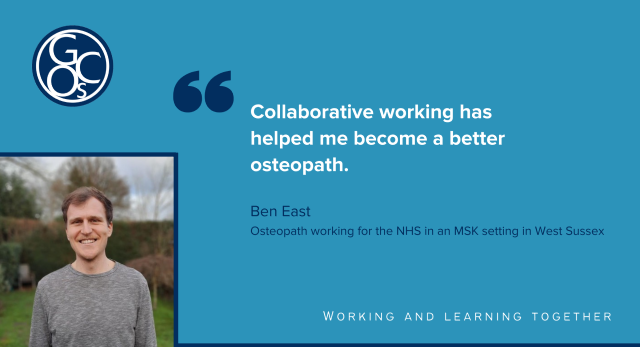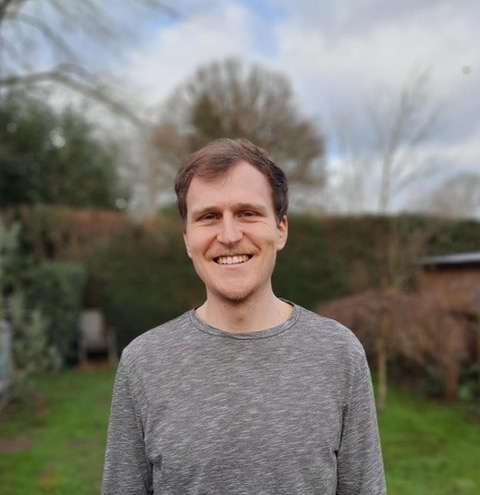Collaborative working has helped me become a better osteopath
7 October 2021
Benjamin East outlines the benefits of working alongside other healthcare professionals as part of a multi-disciplinary team
Working alongside so many different healthcare professionals, such as podiatrists and physiotherapists, and having access to their knowledge and expertise is invaluable. I qualified in 2019 and, after a year in private practice, I welcomed the opportunity to be part of the musculoskeletal (MSK) service in West Sussex. I knew that working with different healthcare professionals would improve my skills and expertise, enabling the consistent delivery of high-quality patient care.
I see a wide variety of patients with a range of conditions, so it can be helpful to have quick access to other healthcare professionals when appropriate, working as allies rather than in competition. As a team, we recognise when a colleague has the skills needed to treat a patient or has expertise in a particular area.
I see similarities in the way we treat patients when I work alongside the physiotherapists on the team, and I have learnt from their strengths, in particular their rehabilitation approaches. I have also gained skills to support patients make their own decisions about the care they receive.

Collaborative solutions
After the surge in hospitalisations caused by COVID-19 in January, I was redeployed to the hospital’s stroke ward for nearly two months. I was part of a multi-disciplinary team including doctors, nurses, physiotherapists, podiatrists, occupational therapists and speech and language therapists. Although the experience was quite daunting at first, it has given me a good understanding of how departments and different health professionals can work together and how they communicate.
The team would meet three times a week to discuss how to meet patient goals. In many cases, collaborative working was the most effective solution. For example, I worked with the speech and language therapist to support a patient who was recovering from a stroke and wanted to go home. I helped provide exercises and worked with the therapist to make sure my recommendations supported the other aspects of the patient’s management. We wanted to give the patient the best chance to achieve their goal.
Overcoming challenges
Many healthcare professionals working in the NHS are aware of osteopathy, but some have limited knowledge about our training and regulation, as well as the similarities between how we manage patients. There is a common misperception that osteopathy is focused solely on back pain, and there has been interest amongst other practitioners to learn more about how we treat certain conditions.
Collaborative working has helped me become a better osteopath. There are times when I recognise that a patient would benefit from accessing different expertise. Working with and being exposed to different health professionals and their skillsets helps me make that judgement and determine the best course of action for the patient.
About Benjamin
Benjamin East graduated from the University College of Osteopathy in 2019 with an M.Ost with Distinction and went on to work in two private clinics before joining the NHS in an MSK setting in West Sussex. The department offers patients a range of different health services including osteopathy, physiotherapy and podiatry. He’s motivated to help people improve their overall health, and has a particular interest in the communication side of practice, as well as the patients’ experience of clinical encounters. This has led him to become a Personalised Care Champion within his role in the NHS, to further develop his skills in this area and help embed the practice within the department.




